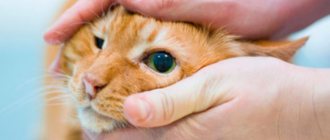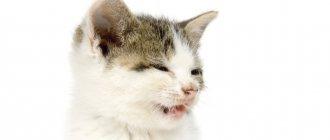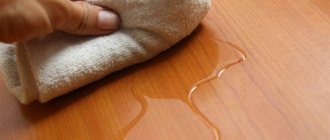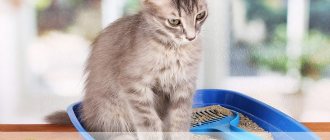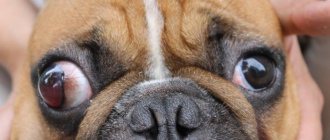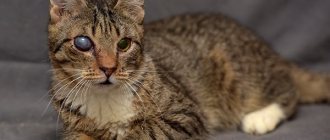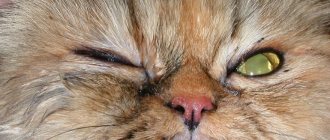The kitten's fragile immunity, restlessness and curiosity make the pet vulnerable to various infections and injuries.
Purulent discharge from the eyes is a common symptom not only of traumatic damage to the conjunctiva, but also of damage to the body by a viral, bacterial or other infection.
We will consider below what to do correctly when purulent discharge is detected.
Why do my kitten's eyes fester?
Suppuration in the eye area in kittens under 3 months of age is a fairly common problem. Moreover, this is not always associated with the influence of the external environment; most often, kittens are born with a problem that gets worse as the animal grows.
Why do a kitten's eyes fester?
- Chlamydia . Oddly enough, not only people, but also cats suffer from this disease. The disease is usually transmitted to kittens when passing through the mother's birth canal. A cat gives birth to her babies with chlamydia, which is why they have infectious conjunctivitis.
- Follicular conjunctivitis . Occurs when inflammation of the lymph nodes occurs. Along with discharge from the eyes, photophobia and swelling in the eyelid area will be observed. Please note that with this disease, hair around the eyes very often falls out.
- Purulent conjunctivitis . Most often it manifests itself in both eyes; with this disease, the cat experiences not only purulent discharge, but also an elevated temperature. Initially, the discharge from the eye area is very thin, but gradually becomes thick, with a green or yellow tint.
Purulent eye
Symptoms
When the owner detects the following signs, he should be alert in order to promptly determine the cause and begin treatment:
- The animal rubs its eye with its paw, it becomes aggressive and restless.
- Lack of appetite, refusal to eat.
- Fear of light can be determined by such signs as preference for a dark corner; while in the light, the cat tries to close its eyes.
- Fever.
- The eyes become red, watery, and pus is released.
- The fur, which is about a century old, has a brown tint.
The kitten is a month old, its eyes are festering: reasons
With blepharitis, the eyelids become inflamed. This occurs due to exposure to an allergen, burn, or contact with harmful chemicals. Blepharitis occurs when a kitten is infected with worms, or with seborrhea. Often occurs due to vitamin deficiency.
Kitten is one month old, eyes are festering, reasons:
- Lesion in the eyelid area . This happens if the baby has a conflict with his brothers and sisters, or other animals with whom he lives. Perhaps you didn’t notice when the cats got into a fight and one scratched the other’s eye.
- Foreign object in the eyelid area . Just like in humans, when particles or food particles come into contact, the eyelids become swollen and the eyes turn sour. It is necessary to remove the foreign object from the eye.
- Violation of temperature standards in the room . In a draft, the kitten may catch a cold.
- Viral diseases. This often happens to homeless and domestic cats. A doctor will help you deal with such ailments.
Conjunctivitis
Which breeds are predisposed to inflammatory eye diseases?
There are cat breeds that are susceptible to increased tearing, which can lead to inflammation. Inflammatory eye diseases most often occur in Sphynx cats. Due to the inversion of the eyelids, these animals often develop chronic conjunctivitis. In addition to the Sphynx, this group includes the Scottish Fold and the British. In the Scots and British, increased tear production is due to the structural features of the muzzle - a narrowing in the area of the bridge of the nose.
Maine Coons, Persians and Exotics also often suffer from inflammatory eye pathologies. If you do not take care of the eyes of such pets, tears flowing down the fur can cause inflammatory dermatological pathologies.
The kitten has snot and festering eyes - reasons: how to treat?
Calcivirus (calcivirosis) is a dangerous viral disease that affects approximately 30% of cats. It is not necessary that the cat be an outdoor cat. The virus can often be carried on clothing or on unwashed hands. The virus can survive on clothes and shoes for about one to two weeks without being introduced into the animal’s body. Therefore, the owner can bring illness from the street. Calcivirus is not dangerous for people, but about a third of cats die from this viral disease and the complications it causes.
Calcivirosis is manifested by the following symptoms:
- Runny nose and sneezing for one to two days.
- Heavy discharge from the eyes. They appear around the third day. The cat's appetite worsens, it may refuse to eat, and its body temperature rises.
- Around the seventh day, small ulcers and stomatitis may appear in the mouth.
The kitten has snot and festering eyes, how to treat:
- Treatment of calcivirosis is antiviral. The animal is given immunomodulators, and concomitant infections that are caused by weakening of the body as a result of exposure to the virus are also treated.
- Very often, cats die from bacterial complications that arise from the virus. Among them are pneumonia, arthritis, arthrosis, dehydration, and kidney failure. These ailments are caused by a virus and its untimely treatment.
- Rashes in the mouth are treated with antiseptics, lubricated with Lugol, and washed with furatsilin solution. Cats are vaccinated against such diseases at a young age. If the cat is outdoors, then the virus can enter the body, because it is transmitted from mother to child.
Conjunctivitis
Diagnostic methods
Before treating conjunctivitis, it is necessary to identify what type of conjunctivitis is present in the child. To do this, first a history of the disease is collected, and then laboratory and ophthalmological examinations are prescribed:
- biomicroscopy of the eye;
- a smear from the conjunctiva followed by cytological examination in the laboratory;
- analysis for the level of IgE and eosinophils in the blood;
- skin allergy tests;
- tests for worms and dysbacteriosis;
- microscopic examination of tear fluid;
- bacteriological examination of discharged pus;
- scraping for enterobiasis.
If an allergic type of disease is suspected, the child is advised to consult an allergist, who will prescribe additional tests.
Kittens' eyes fester and stick together: treatment with traditional methods
There are many ways to cure eye infection in a kitten. The treatment method depends on the original cause. When using the same medications for different ailments, treatment may be ineffective. The easiest way for such purposes is to use neutral agents that will help remove mucus, suppuration, and alleviate the kitten’s condition.
Kittens' eyes fester and stick together, treatment with traditional methods:
- Tea. It is necessary to brew strong tea, without adding fruit, moisten a gauze swab and apply it to the sore eye for a couple of minutes. Wait until the solids are completely dissolved in the tea.
- After this, you need to wipe with a swab from the outer corner of the eye to the inner. After this, you need to take new tampons. New swabs must be used for each eye.
- Chamomile tincture. For these purposes, you need to brew chamomile in the amount of 1 tablespoon of the herb per glass of boiling water. Keep it on low heat for 2 minutes. After this, you need to cool the mixture to a temperature of 20 degrees, moisten a gauze swab or cotton pad in the solution. In the same way, you need to hold it on the kitten’s eyelid for 2 minutes and rub from the outer corner of the eye to the inner one.
Treatment
The kitten's eyes are festering - what should I wash it with?
To wipe the eyes, you can use not only decoctions of medicinal herbs, but also pharmaceutical preparations, which are widely used in surgery and in the treatment of wounds of various origins.
The kitten's eyes are festering, what to wash with:
- Furacilin solution. To prepare the product, you need to dissolve two tablets in 250 ml of hot water and heat almost to a boil, with constant stirring. It is necessary that the tablets dissolve completely. Cool the product to room temperature, soak a cotton pad in it, and wipe the cat’s eyes.
- Potassium permanganate solution. Please note that the liquid should be slightly pink, meaning the solution should be weak. Under no circumstances should a strong solution be used, as it can cause burns to the mucous membrane. A couple of crystals per glass of warm boiled water is enough. In the same way, you need to soak a cotton pad in the resulting solution and wipe your eyes.
- To treat the eyes, you can use ready-made solutions. Among them are Chlorhexidine, Miramistin, Decasan . These solutions are created without the use of alcohol, so they do not cause burns to the mucous membranes or discomfort during treatment. Ready-made products can be purchased at the pharmacy. Choose a solution that is suitable for treating mucous membranes. For example, for Chlorhexidine this is a 0.05% solution. It is necessary to soak a piece of gauze with the product and wipe the kitten’s eyelids from the outer corner of the eye to the inner one. Treatment with such antiseptics is carried out 3 times a day. This removes suppuration and also reduces the kitten's anxiety. After all, suppuration and dry crusts cause discomfort and unpleasant sensations in the animal, so the cat can additionally infect the wound.
Rest
How to treat a kitten’s eyes if they fester?
To treat eye suppuration in kittens, ointment and drops are often used. It is worth noting that ointments are more effective, because due to their thick consistency they remain on the mucous membrane longer, thereby observing a long-lasting therapeutic effect.
How to treat a kitten’s eyes if they fester:
- Tetracycline ointment
- Erythromycin ointment
- Levomycetin
- Phloxal
- Sofradex
All these ointments are best purchased in small tubes with a thin spout. In order to treat a kitten's eyes, you need someone to help you. You need to fix the kitten's head, lift its upper eyelid and insert a thin sausage of ointment into the space between the eyeball and eyelid. If the kitten does not give in and strongly resists, then you can inject the ointment into the lower eyelid area.
Then, by blinking, the animal will independently spread all the ointment over the surface of the eyeball. Please note that these ointments will be ineffective in case of viral infection, since only antiviral agents are used in the treatment of such diseases. In order for ointments to work effectively, they must be used 2-3 times a day.
Kitty
Suppuration with a runny nose, what to do
Eye discharge accompanied by chills, sneezing, and snot most often indicate a runny nose. For a fragile body, a runny nose can serve as an impetus for the development of serious diseases, such as viral rhinotracheitis or calcivirosis.
If you suspect the development of the disease, you should take the animal to a veterinary clinic, where a doctor will examine it, prescribe tests and a treatment regimen.
Medicines that are most often prescribed for colds to treat suppuration:
- anti-inflammatory drugs,
- antibiotics,
- immunomodulators.
The kitten's eye is closed and is festering - what should I use?
Drops can be used to treat eye suppuration in cats. It is worth noting that they are less effective than ointments due to their liquid state. With frequent blinking, they are washed out of the eyes along with tears and secretions. Below is a list of eye drops for suppuration in cats.
The kitten's eye has closed and is festering, what to apply:
- Lachrikan
- Lacrimin
- Tsiprovet
- Barrier
- Dexamethasone
It is necessary to treat suppuration of a cat’s eyes with drops for 2 weeks. Please note that they must be used according to the instructions, most often applied 3-5 times a day, 2 drops in each eye. You will also need the help of someone close to you to stabilize the cat's head and inject the medicine into the eye area.
The situation is more complicated if the cat has blepharitis or keratitis. These diseases must be treated under the supervision of a doctor with regular visits to the clinic. The fact is that infectious blepharitis, as well as keratitis, are often treated with antibiotics, not only local ones, but also those that are administered orally.
Most often these are injections, that is, injections. You may have to take your cat to the veterinary clinic for injections every day. If conservative treatment is ineffective, surgery is often prescribed to remove keratotic nodes, as well as suppuration in the eyelid area, for blepharitis.
Eyes fester
What treatment does the doctor prescribe?
After carrying out the necessary tests, the veterinarian prescribes medications that will cure exactly the disease that caused the suppuration. For example, without eliminating the cause of the allergic reaction, it is useless to wash the cat’s eyes and drip them; pus will still appear. And if suppuration is caused by toxoplasmosis or chlamydia, antibiotic therapy is necessary.
For local treatment, the following drugs are most often prescribed: “Bars”, “Iris”, “Mizofen”, “Neoconjunctivet” or “Anandin”. You can also rinse your eyes from pus with special solutions purchased at a veterinary pharmacy. It is best to use Lakrimin or Medkinos.
A kitten's eyes are festering - prevention
Prevention is of great importance. Very often, cat owners are to blame for the fact that their pets suffer from conjunctivitis. The following rules must be followed to protect your cat from eye infections.
A kitten's eyes are festering - prevention:
- Pet your cat after washing your hands after visiting the street or toilet.
- Do not allow your pet to come into contact with stray animals. Visit your doctor regularly and get tested.
- Do not forget to give your animal vaccinations and also give anthelmintics twice a year. Very often the cause of suppuration is parasites.
- Bathe your animals with flea shampoo. Some pets may have an allergy to flea bites, which results in watery eyes.
- Keep chemicals and detergents used for cleaning the apartment away from the animal. Very often the cause of suppuration and inflammation of the eyes is contact with washing powder or dishwashing detergent.
- Introduce new food gradually, increasing the amount in the diet. Often, when introducing a new food, a pet may experience an allergy.
Kitty
The kitten's eyes are festering: reviews
Please note that in order to choose the right treatment, you need to consult a doctor and read the reviews. Please note that an incorrectly selected remedy may not only not improve the condition, but also cause complications.
The kitten's eyes are festering, reviews:
Oksana. We have an ordinary yard kitten that we picked up from the street. After they brought it home, they discovered that the kitten had terrible sour eyes. We did not go to the veterinarian, we used Furacilin for washing, and smeared it with Tetracycline ointment. After about 2 weeks, the kitten completely recovered.
Maria. Our cat's eyes began to turn sour after a walk outside. Perhaps she caught an infection. We contacted the veterinarian and were prescribed Chlorhexidine rinsing and Floxal ointment. It turned out to be very effective, after about 7 days the eyes stopped turning sour, but we extended the treatment to 2 weeks.
Alexander. Kittens were born in our yard, but the cat does not live in the house, but lives on the street. After the babies opened their eyes, they became very sour. I felt sorry for the kittens, so I periodically rubbed my eyes with strong black tea and dripped cheap drops of Albucid. I myself know that these drops sting, but are effective. After a week, the cats’ health improved and their eyes stopped turning sour.
Sore eye
As you can see, sour eyes in cats is a common problem that can be caused by an allergy to food or injury. With timely diagnosis and treatment, the disease can be completely defeated.
